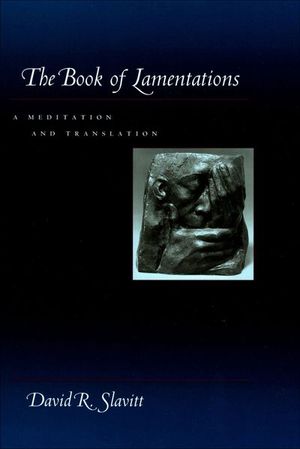The Book of Lamentations
Published by Johns Hopkins University Press
This unique translation of the Old Testament book, with reflections on Judaism’s mournful history, “not only allows but demands rereading” (Pleiades).
Distinguished poet David R. Slavitt here provides a translation of and meditation upon the Book of Lamentations, the biblical account of the destruction of the Temple in Jerusalem in 587 B.C., on the ninth day of the Jewish month of Av—Tish’a b’Av. (Six centuries later the Romans destroyed the second Temple on the same day.) Most of the Jewish population was deported to Babylon, and the ensuing period came to be known as the Babylonian Captivity. According to tradition, the Book of Lamentations was written in response to this political, social, and religious crisis. The five poems composing the book express Israel’s sorrow, brokenness, and bewilderment before God.
Tish’a b’Av is the day on which observant Jews fast and pray. And mourn. As Slavitt observes in his meditation: “It is forbidden on Tish’a b’Av even to study the Torah, except for the Book of Job and the Book of Lamentations. This is the day on which we grieve for every terrible thing that happens in this world. It is the worst day of the year.” Slavitt’s meditation provides a context for reading the scriptural text. Cast in the same style as the Hebrew poetry, his meditation recounts how sorrow and catastrophe have characterized so much of the history of the Jewish people, from their enslavement in Egypt to the Holocaust of Nazi Germany.
Few translations of this remarkable book of the Bible attempt to reproduce in English, as Slavitt does here, the Hebrew acrostics. In the original, each verse begins with a different letter of the Hebrew alphabet in sequential order; Slavitt elegantly reproduces this effect using the first 22 letters of the English alphabet. More than a structural or mnemonic device, Slavitt argues, the acrostics are “a serious assertion that the language itself is speaking, that the speech is inspired, and that there is, beyond all the disaster and pain the book recounts, an intricacy and an orderly coherence.”
Distinguished poet David R. Slavitt here provides a translation of and meditation upon the Book of Lamentations, the biblical account of the destruction of the Temple in Jerusalem in 587 B.C., on the ninth day of the Jewish month of Av—Tish’a b’Av. (Six centuries later the Romans destroyed the second Temple on the same day.) Most of the Jewish population was deported to Babylon, and the ensuing period came to be known as the Babylonian Captivity. According to tradition, the Book of Lamentations was written in response to this political, social, and religious crisis. The five poems composing the book express Israel’s sorrow, brokenness, and bewilderment before God.
Tish’a b’Av is the day on which observant Jews fast and pray. And mourn. As Slavitt observes in his meditation: “It is forbidden on Tish’a b’Av even to study the Torah, except for the Book of Job and the Book of Lamentations. This is the day on which we grieve for every terrible thing that happens in this world. It is the worst day of the year.” Slavitt’s meditation provides a context for reading the scriptural text. Cast in the same style as the Hebrew poetry, his meditation recounts how sorrow and catastrophe have characterized so much of the history of the Jewish people, from their enslavement in Egypt to the Holocaust of Nazi Germany.
Few translations of this remarkable book of the Bible attempt to reproduce in English, as Slavitt does here, the Hebrew acrostics. In the original, each verse begins with a different letter of the Hebrew alphabet in sequential order; Slavitt elegantly reproduces this effect using the first 22 letters of the English alphabet. More than a structural or mnemonic device, Slavitt argues, the acrostics are “a serious assertion that the language itself is speaking, that the speech is inspired, and that there is, beyond all the disaster and pain the book recounts, an intricacy and an orderly coherence.”
BUY NOW FROM
COMMUNITY REVIEWS

